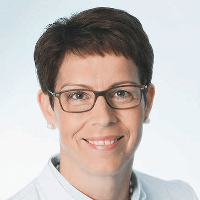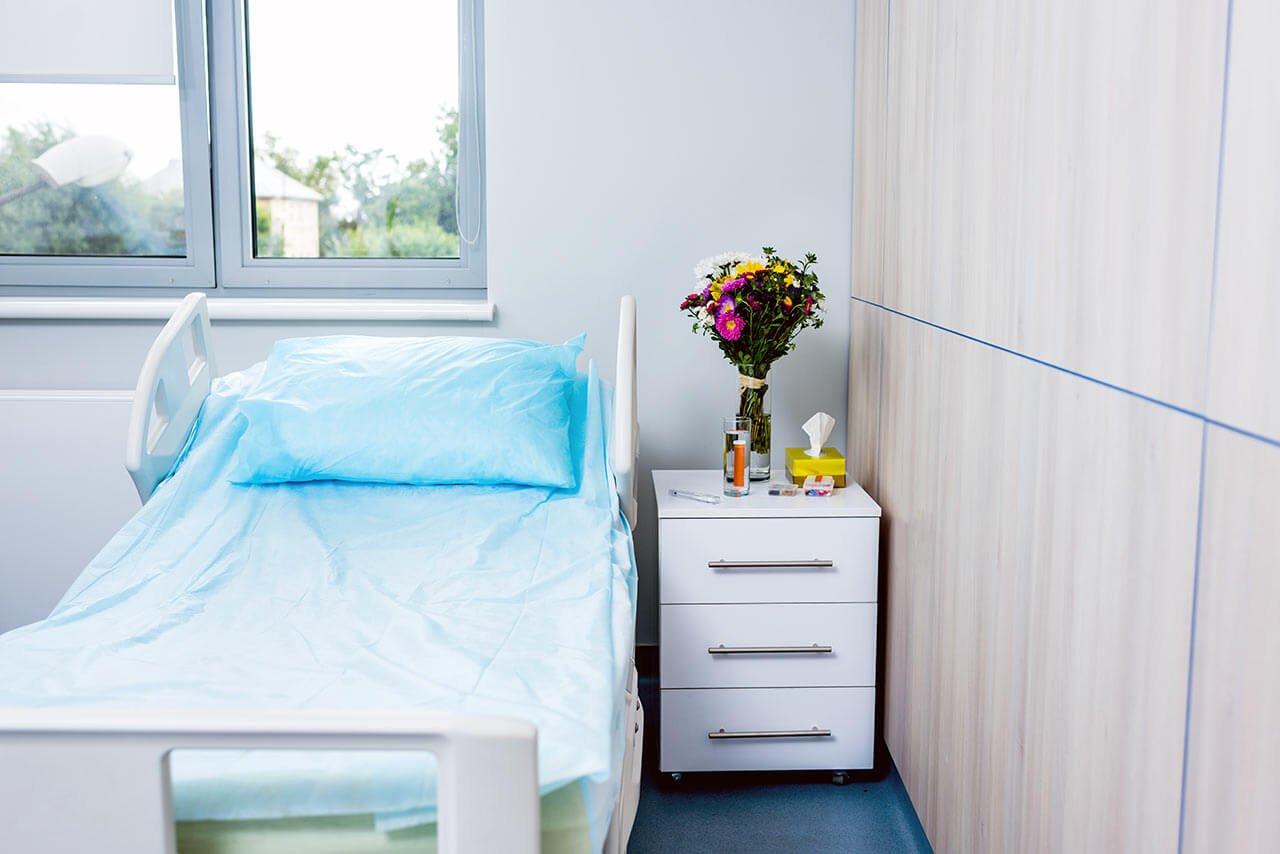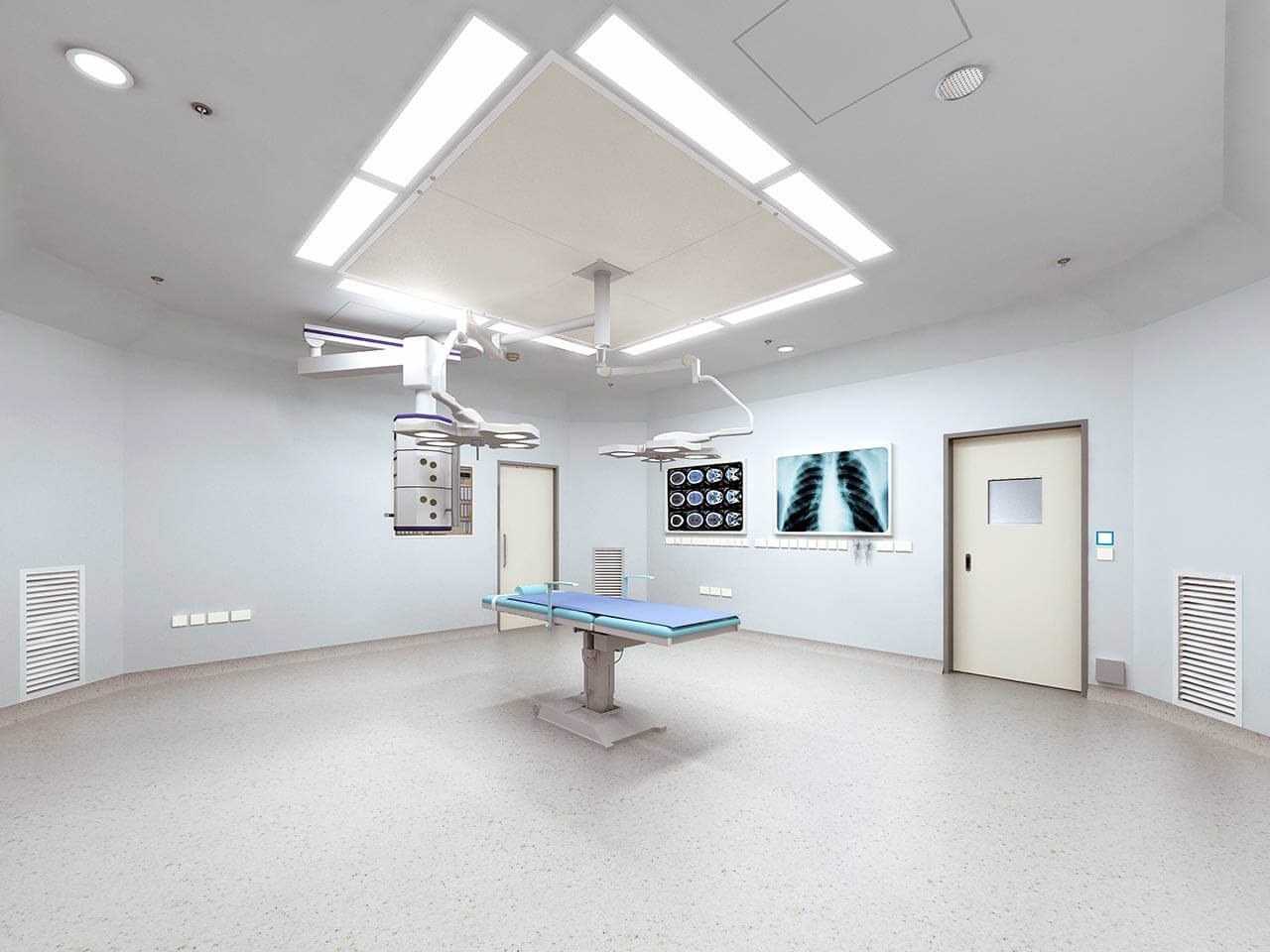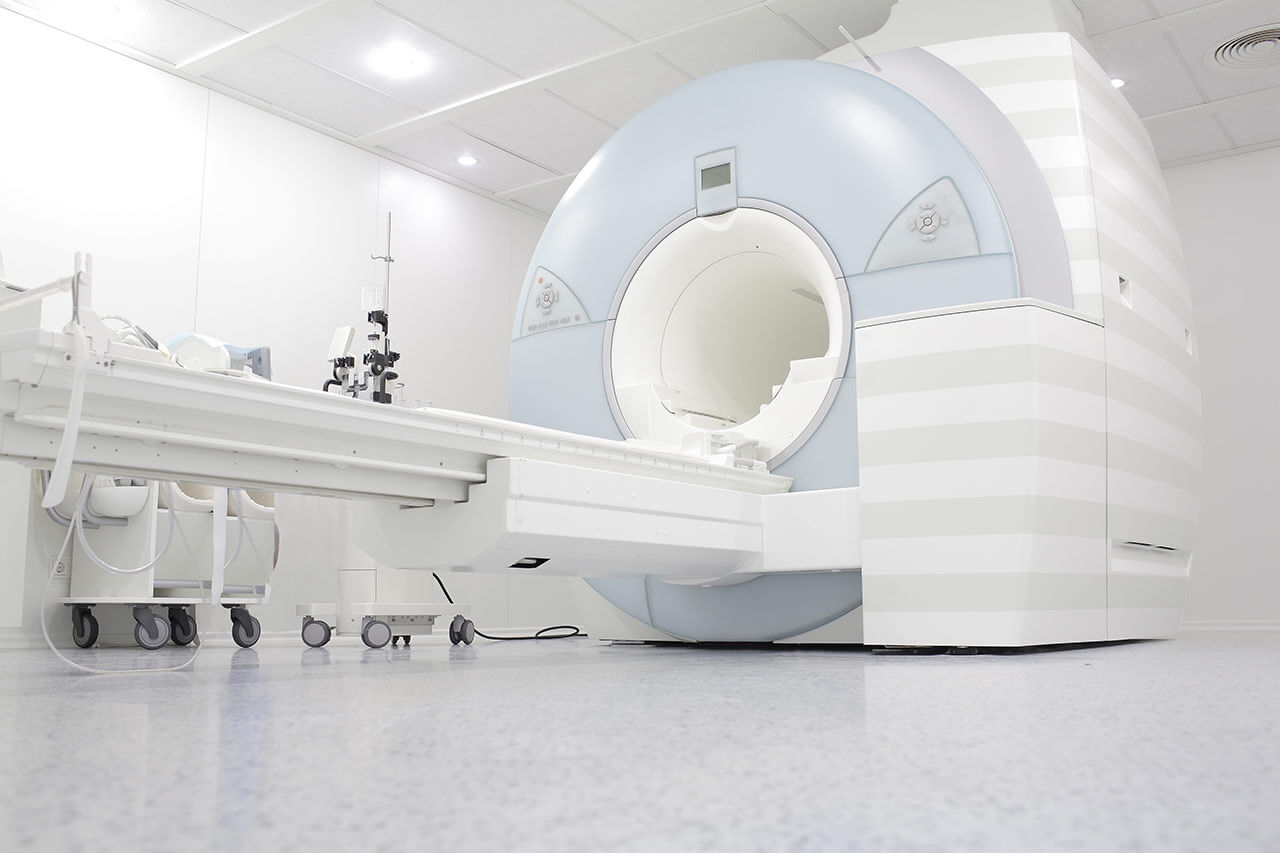
The program includes:
- Initial presentation in the clinic
- clinical history taking
- physical examination
- laboratory tests:
- complete blood count
- biochemical analysis of blood
- tumor markers
- indicators blood coagulation
- procto-/ rectoscopy (static, dynamic)
- rektummanometrie
- endosonography
- defecography (if indicated)
- neurophysiology (if indicated)
- needle EMG of N. pudendus
- CT/MRI abdomen
- colonoscopy
- preoperative care
- sphincterotomy
- symptomatic treatment
- control examinations
- the cost of essential medicines and materials
- nursing services
- nutrition recommendations
- full hospital accommodation
- explanation of future recommendations
Required documents
- Medical records
- Endoanal ultrasound (if available)
Service
You may also book:
 BookingHealth Price from:
BookingHealth Price from:
About the department
The Department of General, Abdominal, Endocrine and Colorectal Surgery at the Hospital Neuperlach Munich provides high-quality surgical treatment of diseases of the abdominal cavity, anterior abdominal wall, colon, anus and pararectal region, as well as endocrine organs (thyroid, parathyroid and adrenal glands). The department specializes in the surgical treatment of both benign and malignant pathologies. Whenever possible, the surgeons use sparing minimally invasive techniques contributing to rapid postoperative recovery and less pain after the intervention. The clinical practice is based on an interdisciplinary approach – the necessary specialists from related medical fields are involved in the therapeutic process, which guarantees the patients the best treatment outcome. The patients' health is in the good hands of a highly qualified medical team consisting of 22 doctors and 60 nursing staff. The medical facility provides treatment to more than 2,600 inpatients and about 2,400 outpatients every year. The department is headed by Prof. Dr. med. Natascha Nüssler.
The specialists in the field of general and abdominal surgery perform surgery to treat pathologies of the digestive tract, namely diseases of the esophagus, stomach, duodenum, small intestine, biliary tract, liver and pancreas. The department is proud of its successful experience in the treatment of esophageal, stomach, liver, biliary tract and pancreatic cancers. The surgeons annually perform over 40 stomach resection surgeries, 80 liver resection surgeries, over 400 gallbladder resection surgeries and over 50 pancreatic resection surgeries. When clinically indicated, operations are performed using minimally invasive techniques, in particular for benign diseases and early stages of cancer. In the case of extensive pathological lesions and progressive stages of cancer, the patient in most cases requires a classical open surgery. In addition, the department's doctors have unique experience in the surgical repair of inguinal hernias, incisional hernias and white line hernias. More than 200 patients with a diagnosis of hernia undergo surgery in the department every year. In most cases, even with large hernias, the doctors perform a sparing laparoscopic intervention.
The department is certified by the German Society for General and Abdominal Surgery (DGAV) as a Center of Competence for Pancreatic Surgery. Pancreatic surgery requires high professionalism and skill of surgeons, and therefore the certification confirms the exceptional quality of surgical treatment of pancreatic diseases in the department. The extensive experience of the surgeons working in the medical facility allows them to perform surgical procedures of any complexity, while the risk of postoperative complications is practically zero. The specialists perform pancreatic interventions in patients with malignant tumors or precancerous conditions, chronic pancreatitis and neuroendocrine tumors. The patients with pancreatic diseases are supervised by both surgeons and therapists, which makes it possible to develop the most sparing and effective treatment regimen. It is obvious that surgery is a last-line treatment.
In the field of endocrine surgery, key attention is paid to the surgical treatment of thyroid, parathyroid and adrenal diseases. The most common surgical interventions include resections of both benign and malignant neoplasms of the above endocrine organs. The specialists always prefer laparoscopic surgical techniques, after the use of which the patient recovers as quickly as possible and does not experience severe pain.
As a certified Reference Center for Coloproctology, the department offers its patients the surgical treatment of all benign and malignant diseases of the colon, rectum and anus. The treatment of rectal cancer is of particular interest to the department's team of surgeons. The department holds leading positions in this field throughout Germany. It performs over 200 surgical interventions for rectal cancer every year. In addition, the department's specialists have extensive experience in the surgical treatment of chronic inflammatory bowel disease, namely ulcerative colitis and Crohn's disease. Depending on the stage of the disease, both minimally invasive and open surgical procedures can be performed. In addition, the department's specialization in the field of colorectal surgery includes surgical treatment of anal fistulas, hemorrhoids, anorectal diseases, as well as conservative and surgical treatment of fecal incontinence, including with follow-up reconstructive surgery.
The main clinical focuses of the department include:
- General and abdominal surgery
- Surgical treatment of benign and malignant diseases of the abdominal organs and gastrointestinal tract
- Esophageal diseases
- Stomach diseases
- Duodenal diseases
- Small intestine diseases
- Biliary tract diseases
- Pancreatic diseases
- Liver diseases
- Hernia repair surgery
- Inguinal hernia
- Incisional hernias
- White line hernia
- Surgical treatment of benign and malignant diseases of the abdominal organs and gastrointestinal tract
- Endocrine surgery
- Surgical treatment of thyroid diseases
- Surgical treatment of parathyroid diseases
- Surgical treatment of adrenal diseases
- Colorectal surgery
- Surgical treatment of colon, rectal and anual diseases
- Rectal cancer (special focus)
- Chronic inflammatory bowel disease (ulcerative colitis and Crohn's disease)
- Anal fistula
- Hemorrhoids
- Anorectal diseases
- Fecal incontinence
- Surgical treatment of colon, rectal and anual diseases
- Other surgical options
Curriculum vitae
Higher Education and Professional Career
- 1984 - 1991 Study of Human Medicine, Free University of Berlin.
- 1991 - 2001 Assistant Physician, Charite University Hospital Berlin, Campus Virchow.
- 2001 - 2007 Senior Physician, Department of General, Abdominal and Transplant Surgery, Charite University Hospital Berlin, Campus Virchow.
- Since 2007 Chief Physician of the Department of General, Abdominal, Endocrine and Colorectal Surgery at the Hospital Neuperlach Munich.
Scientific Activities
- 1993 Doctoral thesis defense in Medicine, magna cum laude, Institute of Molecular Biology and Biochemistry, Free University of Berlin. Thesis subject: "Studies of the effect of 16,16-dimethyl-prostaglandin E2 and prostaglandin synthesis inhibitors – acetylsalicylic acid and indomethacin – on the activity of carbonic anhydrase in the pineal gland and kidneys of chickens".
- 1993 - 1995 Internship abroad, University of Pittsburgh, USA.
- 2001 Habilitation.Thesis subject: "The role of intraepithelial lymphocytes, oxidative stress and endogenous defense mechanisms in maintaining the integrity of the intestinal mucosa".
Specialization and Additional Qualifications
- General surgery.
- Abdominal surgery.
- Vascular surgery.
Clinical Interests
- Abdominal surgery and surgical treatment of gastrointestinal tumors.
- Surgical treatment of esophageal and stomach diseases.
- Surgical treatment of liver and biliary tract diseases (hepatobiliary surgery).
- Surgical treatment of pancreatic diseases.
- Hernia repair (minimally invasive and classic interventions).
Memberships in Professional Societies
- Professional Association of German Surgeons.
- Working Group on Liver, Biliary Tract, Pancreatic Surgery (CA-LGP).
- Working Group on Cancer Surgery (CAO-V).
- German Society for General and Abdominal Surgery (since July 2019 – Board Member).
- German Society of Surgery (2006 - 2008 – Board Member).
- European Hepato-Pancreato-Biliary Association.
- Convention of Leading Hospital Surgeons (1st Chairman, 2012 - 2014).
- Bavarian Association of Surgeons.
- Association for Surgical Oncology (ASO).
Photo of the doctor: (c) München Klinik Neuperlach
About hospital
The Hospital Neuperlach Munich provides modern medical services of the highest quality. The medical center is an Academic Hospital of the Ludwig Maximilian University of Munich, and therefore it can offer its patients innovative diagnostic and therapeutic methods available only in the best German hospitals. The medical complex opened its doors to patients on September 12, 1972 and to this day holds a leading position in the country's medical arena. The medical facility has 500 beds. The highly qualified doctors of the hospital annually admit over 59,000 patients for both diagnostics and treatment, including patients from foreign countries.
The hospital is distinguished by its rich experience and high success rates in conservative and surgical treatment of diseases of the gastrointestinal tract, liver, metabolic disorders, cancers and blood diseases, heart diseases, as well as vascular pathologies. The hospital operates a highly specialized Colon Cancer Center certified by the German Cancer Society. The center is one of the largest medical facilities of this kind in Germany and has advanced therapeutic options for the treatment of life-threatening colon disease. In addition, the hospital provides high-quality obstetric services – more than 1,000 babies are born here annually.
For outstanding achievements in various medical specialties, the hospital was awarded with many prestigious certificates, including the IQM certificate, the DIN EN ISO 9001:2008 certificate, the DGAV certificate as a Competence Center for Liver and Pancreatic Surgery, the DDG certificate of the German Diabetes Society and others. The above mentioned certificates testify to the excellent quality of medical service.
Special attention should be paid to the medical staff of the hospital who have extensive clinical experience and do everything possible to achieve a complete recovery of the patient. During the treatment, both doctors and nursing staff surround the patient with maximum care, support him in every possible way and show a humane attitude. The work of physicians is based on an individual approach to each patient and his clinical case.
Photo: (с) depositphotos
Accommodation in hospital
Patients rooms
The patients of the Hospital Neuperlach Munich live in single, double and triple rooms with all the amenities for a comfortable stay. The patient rooms have a modern and cozy design. Each patient room has an ensuite bathroom with shower and toilet. The furnishings of a standard patient room include an automatically adjustable bed, a bedside table, a wardrobe, a modern multimedia system with a TV and telephone, a table and chairs for receiving visitors. Wi-Fi is also available in the patient rooms.
The patients can also stay in the enhanced comfort patient rooms, which additionally include a safe, a minifridge and upholstered furniture.
The hospital also has a library with a large assortment of books, magazines, CDs and DVDs. In addition, there is a cozy cafe on the territory of the hospital, which offers its guests a variety of delicious snacks, pastries, cakes, ice cream and various drinks. The cafe also has a takeout service.
Meals and Menus
The patient and his accompanying person are offered tasty and healthy three meals a day. All dishes are cooked only from fresh and high quality ingredients. Breakfast and dinner are served buffet style, and the patient can choose the dishes that he likes on his own. For lunch the patient has a choice of three menus, one of which is vegetarian.
If you are on a specific diet for some reason, you will be offered an individual menu. Please inform the medical staff about your dietary preferences prior to the treatment.
Further details
Standard rooms include:
Religion
The religious services are available upon request.
Accompanying person
During the inpatient program, the accompanying person can live with the patient in a patient room or a hotel of his choice. Our managers will help you choose the most suitable option.
Hotel
During the outpatient program, the patient can stay at the hotel of his choice. Our managers will help you choose the most suitable option.





